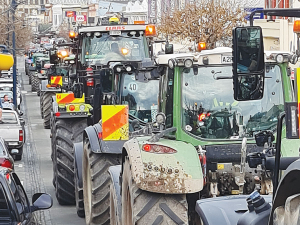94% of NZ farmers oppose Paris Agreement, survey shows
A survey of 2000 farmers shows 94% of respondents believe that remaining in the Paris Agreement for climate change is not in the country's best interest.
 Groundswell motivated thousands of farmers to protest against new government regulations last year and is now advocating an alternative to tackle on-farm emissions.
Groundswell motivated thousands of farmers to protest against new government regulations last year and is now advocating an alternative to tackle on-farm emissions.
Groundswell says it has developed an alternative to the proposed He Waka Eke Noa (HWEN) options to tackle on-farm emissions.
The rural lobby says farmers have not warmed to HWEN's 'exorbitantly expensive' scheme that it claims is littered with unintended consequences and unanswered questions.
"We can't support a punitive emissions pricing scheme that would see farmers paying up to $600 million per year for a negligible reduction in emissions," the group says.
The levy industry bodies' Primary Industry Climate Action Group - or He Waka Eke Noa (HWEN) - has conducted a round of farmer meetings around the country offering three options: an on-farm levy, a processor levy and the Government fallback option of putting the ag sector in the ETS.
However, Groundswell says the HWEN pricing options have shifted from incentivising farmers to uptake new technology and management tools, to a broad-based tax on farming.
"The pricing options currently proposed will allow the Government of the day to tax farmers at a price level of their choosing," Groundswell spokesman Steve Cranston told Rural News.
"If these pricing options proceed, He Waka Eke Noa emissions pricing will not be based on agriculture's effect on climate, but rather to achieve arbitrary government targets, which have no basis in science."
Groundswell says the consultation process has been flawed and has stuck rigidly to predetermined outcomes.
"HWEN gave the appearance of consulting farmers with the formation of a Farmer Reference Group and a pre-consultation feedback opportunity, however, valuable feedback from farmers was brushed off."
Cranston says Groundswell's alternative solution will achieve the sector's expected emission reduction at a fraction of the cost.
"Our integrated Environmental Policy and Action Framework proposes immediate action to build on what farmers are already doing to address emissions," Cranston explains.
"Recognising the current lack of alternatives to addressing emissions, we propose that the agriculture sector adopt a short-term research fund to develop credible emissions reduction alternatives within the He Waka Eke Noa framework."
He says these funding options include utilising the existing industry group levy structure.
"This would be followed by a more comprehensive emissions scheme, which would be developed to subsidise and incentivise new management and technology uptake."
Cranston believes this would allow time for the sector to investigate and test viable solutions.
"By setting price signals on emissions without establishing credible, workable options to reduce emissions, He Waka Eke Noa is forcing farmers and growers to reduce stocking rates and productivity," he adds.
"Since foreign, less carbon-efficient agriculture sectors would just fill the gap New Zealand agriculture would leave, the price signals would lead to an increase in global emissions."
Cranston says under the Groundswell proposal, levy bodies (including DairyNZ and Beef + Lamb) will take a leading role alongside other governmental organisations in investigating the most efficient pathways to achieving emissions reductions, while maintaining productivity and reasonable profitability.
"Modelling shows a significant majority of emissions reductions will be achieved through research and new technology.
"All emissions-related revenue gathering should be focused where it will achieve the most."
Former Fonterra executive Alex Turnbull has been appointed CEO to lead all five Yili Oceania Business Division companies in New Zealand.
Fonterra executive René Dedoncker is leaving the co-operative later this year to lead Australian agribusiness Elders.
Alliance Group and the Southland Stags rugby team have joined forces in a partnership that will see the the meat co-operative's farmgate brand feature on players' team kits and replica jerseys.
Fonterra's plan to expand its organic programme to the South Island is being well received by farmers, the co-op says.
Voting has started for the renewal of DairyNZ's milksolids levy.
The most successful catchment groups in NZ are those that have 'a source to sea' approach.